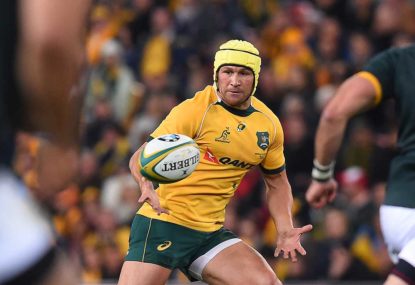There may not be a more relieved man in the world currently than Wallabies prop James Slipper, whose errant intercepted pass very nearly sent Australia packing from the Rugby World Cup.
>> PUMAS STUN IRELAND
>> WALLABIES SCRAPE PAST SCOTLAND
>> ALL BLACKS CRUSH FRANCE
>> SPRINGBOKS ADVANCE PAST WALES
A 79th-minute Bernard Foley penalty won the quarter-final for the Wallabies, beating a heroic Scotland side 35-34 at Twickenham in London.
So typical of a stuttering Wallabies backline performance in this match, Slipper found himself amid some midfield confusion in the 74th minute, when Scottish outside centre Mark Bennett plucked off his desperate pass.
Skipper Greg Laidlaw kicked his seventh goal for the game to put his side 34-32 up with five minutes to play, before Scotland were ruled to have regained possession from an offside position off the back of a lineout stolen by the Wallabies, as they scrapped to find one last score in the dying minutes.
Foley’s match-winner was his fourth straight goal for the second half, turning around three worrying missed conversions in the first 40.
The Wallabies now play Argentina in the second Rugby World Cup semi-final next weekend, after Los Pumas hammered Ireland 43-20 in the earlier quarter-final on Sunday.
Australia’s win also confirmed an all-southern hemisphere semi-final stage, with South Africa and New Zealand meeting in the other knockout match next weekend. The Rugby Championship has essentially had an extra two weeks added to the shortened 2015 schedule.
Scotland’s performance should do the Wallabies a massive favour.
The Scots exposed poor decision-making, highlighted lazy defending, punished poor skill-execution, and generally gave the Wallabies an 80-minute serving of constant face-slapping and arse-kicking. If the Wallabies learn nothing from this win, then they deserve no further progress.
After two weeks of outstanding attack and defence against England and Wales, respectively, Australia showed nothing of the sort against a Scotland side committed to continually ask serious questions.
Whether it was a case of looking ahead, or perhaps not fully respecting an opposition who have in recent years relished embarrassing the much higher-ranked Wallabies, the inescapable point stands that Scotland proved that Australian dunderheadedness still lurks below the surface.
It should, at least, make Michael Cheika’s job easier this week.
He has an endless supply of uncomfortable moments, poor passes, shanked kicks, and soft defence to bring any semblance of Wallabies over-confidence crashing back to earth.
One thing that is clear is that David Pocock cannot return soon enough. His presence was missed at the breakdown from the first minute of the match, and though the backrow of Scott Fardy, Michael Hooper, and Ben McCalman played their natural games reasonably well, it was very clear very early in the piece that Pocock’s over-the-ball pressure ties the Wallabies breakdown together.
Too often, Australian ball-carriers found themselves on their own, with support runners and any potential ruck-cleaners regularly caught too deep. Scotland’s own double team of on-ballers, Blair Cowan and John Hardie, applied their own pressure in and around the ruck, which – even if they didn’t get a play on the ball – was generally enough to slow the Wallabies’ momentum down.
If there’s a silver lining to the disappointing performance, it’s that the Wallabies certainly couldn’t play any worse in this tournament. The slick attack that scythed England was nowhere to be seen, and it would be too simple to single out any one player, because all the backs were guilty of contributing to turnovers.
Whether it was good luck, or a spattering of good management, Australia were able to find tries when they put their mind to it. If they could build phases and maintain possession long enough – no guarantee on either count – there was often space out wide.
Sure, Drew Mitchell’s second try in the left corner was possible because of Craig Joubert and TMO Ben Skeen’s mind-blowingly ridiculous decision that Scottish winger Sean Maitland had deliberately knocked down an Australian pass, but when the Wallabies were able to hold their composure, they found space out wide.
And when the backs invariably lost said composure, the forwards were capable of resetting through the pick-and-drive, or the lineout dive, which though a little loose without Pocock in the driver’s seat, was still reasonably effective.
History will eventually just show a one-point win for the Wallabies, and Cheika has a big week ahead of him to rectify the issues that will similarly consign the Australian World Cup campaign to history if not quickly addressed.
The scrum in general didn’t operate as cohesively as it has, nor was it able to establish the dominance it has enjoyed in recent weeks, and Scottish tighthead WP Nel gave Scott Sio an almighty working over.
The defence around the edge of the ruck was often passive, highlighted no better than Scotland centre Peter Horne’s 18th minute try, where he strolled through to the middle of Sio and Rob Simmons, who were left with nothing but sheepish looks on their faces.
If the England and Wales results took a bigger emotional and even physical toll than we realise, then it’s better to get the sub-par performance out of the way now.
Argentina’s clinical late-game dissection of Ireland shows the Wallabies where they need to get to this week, as does New Zealand’s complete annihilation of France. South Africa played a very limited game to dispose of a brave Welsh side, but at least their very limited game was executed according to plan.
In contrast, it was difficult to see what the Wallabies’ plan was against a committed Scotland.
And yes, it’s great that they were still capable of extracting the win, and that they remain alive in the tournament. But the real challenge for the Wallabies now is to prove that the Scotland performance – and not the England and Wales wins – is their Rugby World Cup 2015 anomaly.





























































































